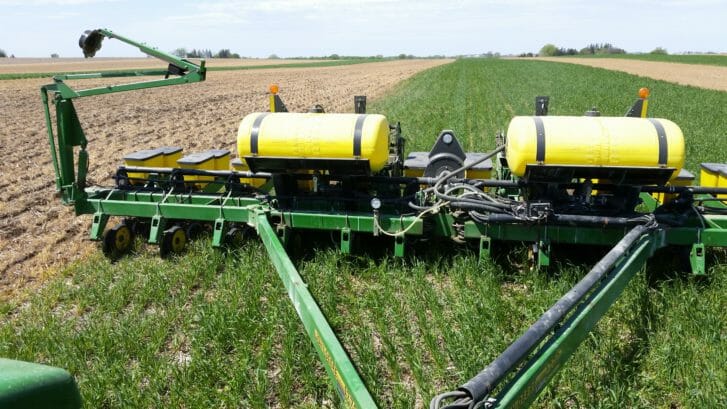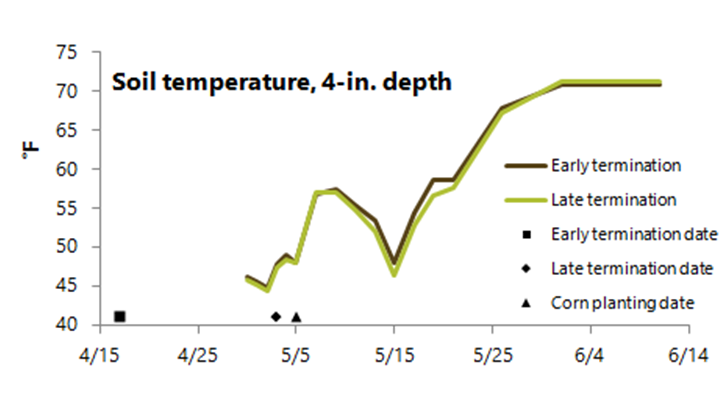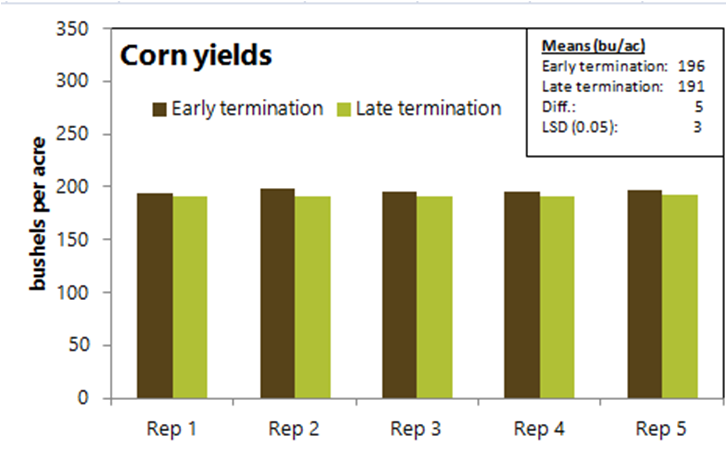RESEARCH REPORT: Cover Crop Termination Date Ahead of Corn
Delaying cover crop termination until corn planting is commonly understood to cause corn yield drag. However, the potential for increased cover crop growth by delaying termination has farmers wondering if that yield drag is true and/or can be overcome. Farmer-cooperator Dick Sloan planted corn on the same date (May 5) following two cover crop termination dates: 2 weeks prior to planting corn (early) and 2 days prior to planting corn (late).
The objective of this research project was to quantify the agronomic performance of corn when delaying cover crop termination until the day of corn planting. Sloan adds, “I want to compare my results with corn to what other farmer-cooperators have previously found with soybeans. I want to grow covers longer into the spring, but I don’t want to hurt my corn crop.”
You can read the full report here: Cover Crop Termination Date Ahead of Corn.

Dick Sloan planting corn into a “green” cover crop on May 5, 2016. The cover crop (winter wheat+winter barley+cereal rye) was terminated on May 3 and amounted to 1,985 lb/ac of aboveground biomass.
Here’s how Dick conducted the trial:
- Oct. 5, 2015: Drilled cover crop into soybean stubble (winter wheat, 60 lb/ac; winter barley, 15 lb/ac; cereal rye, 15 lb/ac).
- Apr. 17, 2016: “Early” termination date of cover crop.
- May 3: “Late” termination date of cover crop.
- May 5: Planted corn in 30-in. rows at a population of 34,000 seeds/ac.
- Applied 35 lb N/ac with the planter.
- June 11: Side-dressed 105 lb N/ac to all strips.
- Oct. 24: Corn harvested from each strip individually.
Key Findings:
- Dick collected soil temperatures to the 4-in. depth in strips every few days beginning on Apr. 30 and ending on June 11. Soil temperatures were slightly warmer for one week in May for the early termination date treatment (figure below).

Soil temperatures to the 4-in. depth at Dick Sloan’s from Apr. 30 to June 11, 2016.
- Dick saw a significant 5 bu/ac average corn yield reduction with the late cover crop termination date (figure below).

Corn yields from each Rep at Dick Sloan’s in 2016. Mean yields and the least significant difference (LSD) at the P ≤ 0.05 level are indicated in the inset table. Because the difference between the two treatment means is greater than the LSD, the treatments are considered significantly different.
For more details on this trial, read the full report: Cover Crop Termination Date Ahead of Corn. Support for this trial was provided by the Iowa Department of Agriculture and Land Stewardship, Division of Soil Conservation.
For more information about this study and other studies as part of PFI’s Cooperators’ Program, contact Stefan Gailans at stefan@practicalfarmers.org.
